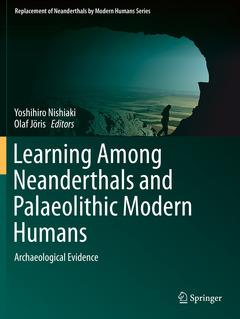Learning Among Neanderthals and Palaeolithic Modern Humans, 1st ed. 2019 Archaeological Evidence Replacement of Neanderthals by Modern Humans Series

Olaf Jöris received his Ph.D. from the University of Cologne, Germany. He is senior scientist at and deputy head of the MONREPOS Archaeological Research Centre and Museum for Human Behavioural Evolution in Neuwied, Germany – a department of the Römisch-Germanisches Zentralmuseum Mainz, Leibniz Research Institute for Archaeology. His research focuses on the archaeological evidence for understanding the evolution of human behaviour from a diachronic perspective. He has directed fieldwork in Germany, Georgia, and China. He has been involved in numerous inter- and transdisciplinary projects, regularly serves as reviewer or editor in international journals, and is member of several international research organizations. He teaches prehistoric archaeology at the Johannes Gutenberg University Mainz, Germany, and, since 2014, has been a visiting professor at Lanzhou University, Gansu Province, China.
Highlights learning strategies to understand the replacement processes of Neanderthals by modern humans
Presents the latest overview of archaeological records on learning behaviours among Neanderthals and modern humans
Provides methodological contributions to explore prehistoric learning strategies with archaeological records
Date de parution : 01-2021
Ouvrage de 218 p.
21x27.9 cm
Date de parution : 12-2019
Ouvrage de 218 p.
21x27.9 cm



